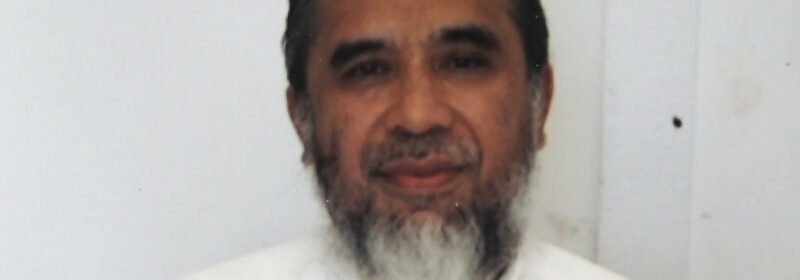Bali bombers must wait another two years for day in Guantanamo court

Save articles for later
Add articles to your saved list and come back to them any time.
Guantanamo Bay, Cuba: In a hybrid federal-military US court in Cuba, a prosecutor has proposed a March 2025 trial date for three men accused of conspiring in the 2002 Bali bombings.
He also pledged to present the military judge with all proposed national security evidence in the case in the next nine months.
Encep Nurjaman, also known as Hambali, in an undated photo at the US base in Guantanamo Bay, Cuba.Credit: AP
Defence lawyers protested the timeline as too long for the three men – an Indonesian and two Malaysians – who have been held by the United States since 2003. They asked the judge to require prosecutors to explain ongoing negotiations with the CIA and other intelligence agencies about the evidence.
“These gentlemen have been incarcerated for 20 years, judge, and these men are entitled to a trial,” said James R Hodes, criminal defence lawyer for the Indonesian man, Encep Nurjaman, better known as Hambali.
Hodes complained that, 20 months after the men were first brought to court, prosecutors have yet to share with them statements the defendants made while in US custody.
In federal court, Hodes said, that is routinely done the day a defendant is charged.
US defence lawyer James Hodes has been representing Hambali since October 2019.Credit: AP
Prosecutors accuse the three prisoners – Nurjaman, Mohammed Nazir Bin Lep and Mohammed Farik Bin Amin – of murder, terrorism and conspiracy in the bombings in Bali, Indonesia, which killed 202 people including 88 Australians, and in the 2003 Marriott hotel bombing in Jakarta, the capital, which killed at least 11 people and wounded at least 80.
The defendants were captured in Thailand in 2003 and spent more than three years in the secret CIA prison network, where, according to their lawyers, they were tortured. They were taken to Guantanamo Bay in 2006. Monday was their first return to the courtroom since a two-day arraignment in August 2021.
At the back of the courtroom, in a spectators’ chamber, guests of the prosecution taped photos of four men into four empty front-row seats, apparently representing victims of the Bali bombing. Colonel George C Kraehe, the lead prosecutor, announced that relatives of the victims “have travelled a long distance to be here participating in these proceedings”.
The defendants, in traditional tunics, trousers and skullcaps, said little in court, but complained to the judge about the translations of the session, an issue they also had during their only other court appearances in 2021.
A control tower is seen through the razor wire inside the Camp VI detention facility at Guantanamo Bay Naval Base in 2019.Credit: AP
Sometimes the Malaysians heard Indonesian dialect through their headsets, and sometimes the Indonesian heard translations meant for the Malaysians. Also, their lawyers protested, the military’s contract interpreters sometimes resorted to English when they forgot a key word. For example, an interpreter could not remember how to say “interpreter” in Malaysian dialect.
Separately, the judge declined to excuse an interpreter who had previously remarked that the US government was “wasting so much money on these terrorists. They should have been killed a long time ago.” Instead, the judge cautioned the interpreters – who were working from a remote location – that he expected their translations to be “neutral, sanitised, surgical”.
An undated Guantanamo mugshot of Mohammed Nazir bin Lep. Credit: US Department of Defence
Defence lawyers sought an order from the judge to require prosecutors to be more transparent and proposed a December trial date, essentially to force the government to turn over the evidence.
One explanation for the delay is that at Guantanamo’s hybrid federal-military court, the Pentagon prosecutors work with US intelligence agencies to decide what evidence must be withheld from the trial.
Together, they redact documents or fashion substitutions for actual evidence and seek permission to use them instead.
A judge compares the revisions to the original evidence and, if he decides they are inadequate, returns them to prosecutors, to essentially do better. Kraehe said the government should present all evidence and substitutions for the judge’s review by January 31.
But he said March 2025 was the earliest practical date to start a trial. This is the last hearing under the current judge, Captain Hayes C Larsen of the Navy, and Kraehe said neither the prosecution nor a new judge would be ready any sooner.
Once defence lawyers receive all the evidence, the case goes into pretrial hearings, with the opportunity to call witnesses, seek missing evidence – and, most likely, argue that some evidence was tainted by the defendants’ CIA captivity.
In 2003, a CIA interrogator told Nurjaman that he would never go to court because “we can never let the world know what I have done to you”, according to a study of the CIA program that was released by the Senate Intelligence Committee in December 2014.
Lieutenant Colonel Chantell Higgins of the Marines, a lawyer defending Bin Amin, accused the US government of misplaced priorities. It spent millions of dollars on “a systemic torture program”, she said.
“But when it comes to administering justice, we want to penny-pinch. We want to say, ‘We don’t have the resources. We don’t have the computers. It’s complex’.”
“It’s America,” she added. “We can do it if we want to.”
This article originally appeared in The New York Times.
Get a note directly from our foreign correspondents on what’s making headlines around the world. Sign up for the weekly What in the World newsletter here.
Most Viewed in World
From our partners
Source: Read Full Article



